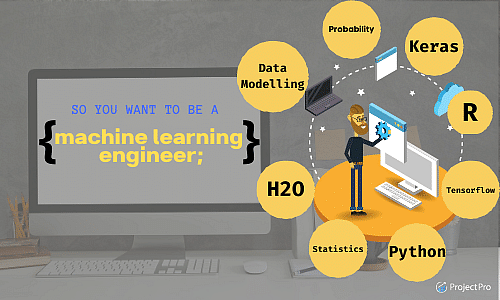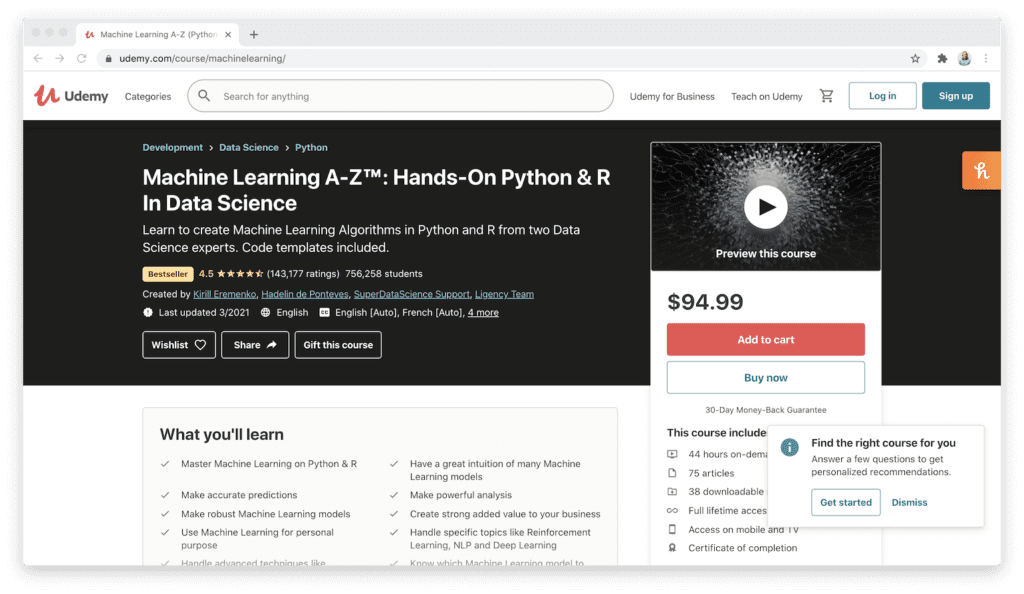All Categories
Featured
Table of Contents
- – Our Machine Learning Engineer Learning Path Ideas
- – How I’d Learn Machine Learning In 2024 (If I W...
- – Not known Factual Statements About Machine Le...
- – How To Become A Machine Learning Engineer Thi...
- – The smart Trick of Software Engineering For ...
- – A Biased View of Aws Certified Machine Learn...
- – All About Machine Learning Engineer: A Highl...
Some people think that that's unfaithful. If someone else did it, I'm going to use what that individual did. I'm requiring myself to assume through the possible solutions.
Dig a little bit deeper in the math at the start, just so I can develop that structure. Santiago: Lastly, lesson number seven. I do not believe that you have to recognize the nuts and screws of every formula prior to you utilize it.
I've been utilizing semantic networks for the lengthiest time. I do have a sense of how the gradient descent functions. I can not explain it to you right now. I would need to go and inspect back to in fact get a much better instinct. That does not mean that I can not solve things making use of neural networks? (29:05) Santiago: Attempting to compel people to assume "Well, you're not mosting likely to be effective unless you can explain each and every single detail of exactly how this works." It returns to our sorting example I assume that's simply bullshit guidance.
As a designer, I have actually dealt with lots of, many systems and I've made use of many, several things that I do not recognize the nuts and bolts of exactly how it works, although I comprehend the impact that they have. That's the last lesson on that particular string. Alexey: The funny point is when I believe about all these libraries like Scikit-Learn the formulas they utilize inside to apply, for instance, logistic regression or another thing, are not the same as the algorithms we examine in machine discovering courses.
Our Machine Learning Engineer Learning Path Ideas
Also if we tried to learn to get all these basics of equipment understanding, at the end, the algorithms that these libraries utilize are different. ? (30:22) Santiago: Yeah, absolutely. I believe we require a great deal much more materialism in the market. Make a whole lot more of an effect. Or concentrating on supplying value and a little much less of purism.

Incidentally, there are two various courses. I generally speak with those that wish to operate in the sector that desire to have their influence there. There is a path for researchers and that is totally different. I do not dare to speak concerning that due to the fact that I don't recognize.
Right there outside, in the industry, materialism goes a long method for certain. (32:13) Alexey: We had a comment that claimed "Really feels even more like inspirational speech than speaking about transitioning." So possibly we ought to change. (32:40) Santiago: There you go, yeah. (32:48) Alexey: It is a great motivational speech.
How I’d Learn Machine Learning In 2024 (If I Were Starting ... Things To Know Before You Get This
One of the things I intended to ask you. I am taking a note to speak about progressing at coding. Initially, let's cover a pair of points. (32:50) Alexey: Let's start with core devices and frameworks that you need to find out to really transition. Allow's say I am a software program engineer.
I understand Java. I know just how to make use of Git. Maybe I know Docker.
What are the core devices and structures that I need to learn to do this? (33:10) Santiago: Yeah, absolutely. Great inquiry. I believe, top, you need to begin finding out a little of Python. Considering that you currently understand Java, I don't believe it's going to be a huge shift for you.
Not since Python is the exact same as Java, yet in a week, you're gon na get a great deal of the distinctions there. Santiago: After that you get specific core devices that are going to be made use of throughout your whole job.
Not known Factual Statements About Machine Learning
That's a collection on Pandas for data control. And Matplotlib and Seaborn and Plotly. Those three, or one of those three, for charting and presenting graphics. You get SciKit Learn for the collection of equipment knowing formulas. Those are devices that you're mosting likely to need to be making use of. I do not advise just going and finding out about them out of the blue.
Take one of those programs that are going to start presenting you to some issues and to some core concepts of device understanding. I don't bear in mind the name, but if you go to Kaggle, they have tutorials there for complimentary.
What's good concerning it is that the only need for you is to understand Python. They're mosting likely to provide a trouble and tell you just how to make use of decision trees to fix that particular issue. I believe that procedure is extremely powerful, since you go from no machine discovering background, to comprehending what the problem is and why you can not fix it with what you know today, which is straight software design techniques.
How To Become A Machine Learning Engineer Things To Know Before You Get This
On the other hand, ML engineers specialize in building and deploying artificial intelligence models. They concentrate on training models with data to make forecasts or automate jobs. While there is overlap, AI engineers take care of more varied AI applications, while ML engineers have a narrower concentrate on equipment understanding formulas and their practical application.
Machine knowing engineers focus on establishing and deploying machine learning versions into manufacturing systems. On the various other hand, data scientists have a wider function that includes data collection, cleaning, exploration, and building versions.
As organizations significantly adopt AI and machine knowing technologies, the demand for competent specialists grows. Machine learning engineers work on advanced tasks, add to development, and have affordable incomes.
ML is essentially different from traditional software application advancement as it concentrates on teaching computers to learn from data, rather than programming explicit rules that are executed systematically. Unpredictability of outcomes: You are probably utilized to writing code with predictable results, whether your function runs as soon as or a thousand times. In ML, however, the results are much less particular.

Pre-training and fine-tuning: Exactly how these models are trained on vast datasets and then fine-tuned for specific tasks. Applications of LLMs: Such as text generation, sentiment analysis and info search and access. Papers like "Interest is All You Required" by Vaswani et al., which presented transformers. On-line tutorials and training courses concentrating on NLP and transformers, such as the Hugging Face training course on transformers.
The smart Trick of Software Engineering For Ai-enabled Systems (Se4ai) That Nobody is Talking About
The capability to handle codebases, merge modifications, and resolve disputes is equally as essential in ML development as it remains in conventional software application jobs. The abilities established in debugging and testing software program applications are highly transferable. While the context may change from debugging application logic to identifying concerns in data processing or model training the underlying principles of organized investigation, hypothesis testing, and iterative improvement are the very same.
Device knowing, at its core, is heavily reliant on data and possibility concept. These are essential for understanding exactly how algorithms learn from data, make forecasts, and review their performance.
For those interested in LLMs, a complete understanding of deep understanding styles is valuable. This includes not only the mechanics of semantic networks yet additionally the architecture of specific designs for different usage instances, like CNNs (Convolutional Neural Networks) for image handling and RNNs (Reoccurring Neural Networks) and transformers for consecutive information and all-natural language handling.
You ought to understand these problems and discover strategies for recognizing, reducing, and communicating concerning prejudice in ML versions. This consists of the possible effect of automated decisions and the honest implications. Lots of versions, especially LLMs, require substantial computational sources that are usually provided by cloud systems like AWS, Google Cloud, and Azure.
Structure these skills will not only promote a successful transition right into ML but also ensure that designers can contribute efficiently and responsibly to the advancement of this vibrant area. Concept is vital, but absolutely nothing beats hands-on experience. Start functioning on jobs that allow you to apply what you've found out in a sensible context.
Develop your jobs: Start with basic applications, such as a chatbot or a message summarization device, and gradually raise intricacy. The field of ML and LLMs is quickly progressing, with brand-new innovations and modern technologies emerging regularly.
A Biased View of Aws Certified Machine Learning Engineer – Associate
Join neighborhoods and forums, such as Reddit's r/MachineLearning or neighborhood Slack channels, to talk about ideas and get suggestions. Go to workshops, meetups, and seminars to get in touch with various other experts in the area. Contribute to open-source tasks or create blog site posts about your learning journey and tasks. As you get know-how, start seeking possibilities to incorporate ML and LLMs into your job, or look for brand-new duties concentrated on these modern technologies.

Possible usage situations in interactive software program, such as referral systems and automated decision-making. Understanding unpredictability, basic statistical measures, and chance distributions. Vectors, matrices, and their role in ML algorithms. Mistake reduction methods and gradient descent clarified simply. Terms like version, dataset, functions, labels, training, reasoning, and validation. Data collection, preprocessing methods, design training, examination processes, and deployment factors to consider.
Choice Trees and Random Forests: Instinctive and interpretable versions. Matching problem kinds with ideal designs. Feedforward Networks, Convolutional Neural Networks (CNNs), Persistent Neural Networks (RNNs).
Data flow, transformation, and attribute engineering methods. Scalability principles and performance optimization. API-driven techniques and microservices integration. Latency administration, scalability, and variation control. Continuous Integration/Continuous Implementation (CI/CD) for ML process. Design monitoring, versioning, and performance monitoring. Discovering and dealing with changes in version performance gradually. Addressing efficiency bottlenecks and source management.
All About Machine Learning Engineer: A Highly Demanded Career ...

Training course OverviewMachine discovering is the future for the following generation of software specialists. This training course serves as a guide to artificial intelligence for software program designers. You'll be presented to 3 of the most relevant components of the AI/ML technique; managed learning, neural networks, and deep understanding. You'll comprehend the differences between conventional programs and machine knowing by hands-on advancement in monitored discovering before developing out complex dispersed applications with semantic networks.
This training course offers as an overview to equipment lear ... Show Extra.
Table of Contents
- – Our Machine Learning Engineer Learning Path Ideas
- – How I’d Learn Machine Learning In 2024 (If I W...
- – Not known Factual Statements About Machine Le...
- – How To Become A Machine Learning Engineer Thi...
- – The smart Trick of Software Engineering For ...
- – A Biased View of Aws Certified Machine Learn...
- – All About Machine Learning Engineer: A Highl...
Latest Posts
A Day In The Life Of A Software Engineer Preparing For Interviews
How To Self-study For A Faang Software Engineer Interview
The Best Strategies For Answering Faang Behavioral Interview Questions
More
Latest Posts
A Day In The Life Of A Software Engineer Preparing For Interviews
How To Self-study For A Faang Software Engineer Interview
The Best Strategies For Answering Faang Behavioral Interview Questions